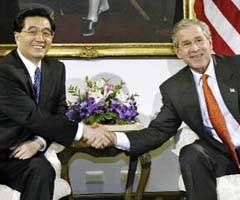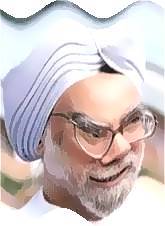
When an Indian newspaper ends up breaking the news that U.S. President George W. Bush, during his recent visit to Beijing, urged his Chinese counterpart, Hu Jintao, not to arm the Royal Nepalese Army, it’s not difficult to figure out the kind of stakes Nepal holds in international power politics.
The Indian newspaper didn’t give the full story. Here’s what Maila Baje pieced together from all those tea leaves in the Chinese capital:
Bush: Okay, Hu, let’s turn to Nepal. I’ve been getting a lot of heat from the Indians on your cozying up to the king. Not that I don’t have bruised feelings. We gave the king the benefit of the doubt the first time he sacked Deuba. But the second time? He orders Deuba arrested on phony corruption charges when the real scumbags are walking free. This is a calculated snub to the United States. And you’re helping the king.
Hu: George, that’s not fair – and you know it. You were arming and training Nepalese soldiers until January. We wanted to be your true partners in the war on terror, so we didn’t complain when all those American colonels took turns visiting Nepal. We knew that you had at least three dozen special op guys at any given time.
And the royal takeover? You armed the military so heavily that it’s supreme commander felt emboldened to take power.
We’ve stepped in only after you, the Brits and Indians imposed an arms embargo.
You wanna talk about hurt feelings? How do you think we feel when we see you pampering Taiwan?
Bush: Hu, you don’t get it. Deuba is the only Nepali I can remember having met. He’ll probably get a paragraph or two in my memoirs once Laura and I move back to the ranch.
Probably it’s because his name sounds a lot like Dubya. But, no, I really have great regard for the guy.
After 9/11, he was the first South Asian leader to publicly offer us use of airspace for the Afghan war. Now, a lot of people made fun of that offer, considering the size of Nepal’s skies and the lack of direct access to the Afghan theater. But it was the gesture that impressed us.
Hu: Now that you brought up gestures, we were impressed by the Nepali king’s effort to have China included in the South Asian Association for Regional Cooperation. Earlier this year, he ordered the Tibetan exiles to close their offices in Nepal. As someone who once served in Tibet, and knows all the mischief you guys have been up to, that means a lot.
Bush: Coming back to Deuba, despite all the differences we had, Colin Powell and I agreed that Deuba represented the best hope for reconciliation in Nepal. Colin pointed out to me that Deuba was the first – and only – Nepali prime minister trained in the West, although I don’t know what he exactly studied at the London School of Economics.
Moreover, he is a true friend of America -- if you know what I mean.
Hu: If you look over the decades, you’ll understand why we feel the king is China’s only friend in Nepal. Chairman Mao once suggested to a Nepali visitor that he considered the king a communist with a crown.
The elected democratic leaders are wholly owned subsidiaries of the Indian political establishment.
We once invited Girija Prasad Koirala to Beijing as part of an effort to reach out to all parties. The man flew straight to New Delhi to brief his Indian mentors.
And this Madhav Kumar Nepal chap. He recently criticized us for supporting the king and that too while on a visit to India.
Of course, we know he was just saying what the official Indian government spokesman could not in public. But did he have to make his real loyalties so blatantly obvious?
Bush: But Deuba…
Hu: Cut it out George, I get the message. Look I’ll do what I can to try and get Deuba released and all charges dropped. Since all this seems to be about Deuba for you, here’s the deal. Once the king makes Deuba’s release and exoneration official, you must immediately restore full ties with the royal government. Make Scott McClellan issue a formal statement welcoming this gesture of reconciliation.
Deuba and the king will join hands to defeat the Maoists. Now don’t be fooled by the Maoists’ alliance with the mainstream parties – you don’t know what hard-core Maoists are capable of. I do – because I used to be one.
Bush: That’s fine with us. What do you want out of all this?
Hu: I know you can’t officially abandon Taiwan because of your domestic compulsions. So I won’t ask you to do that. Just stop accusing us of manipulating the yuan. And, yes, we get to keep selling those guns to Nepal.
